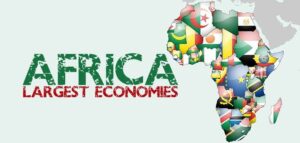Welcome to this post about the Top 10 Strongest African economies, via Afrokonnect. Africa is showing the potential of a region with great economic prospect and promise. The factors accompanied with vast resources and a growing consumer market has projected Africa as a continent with immense economic potential. Even though various African economies are facing serious challenges but they still keep striding forward.
The world is striding into the 3rd decade of the 21st century and Africa hasn’t been left behind. The continent is making various strides forward which suggests the growth of the world’s most vibrant consumer base. In this article we will analyse and provide an in-depth analysis on Top African economies in 2024. We shall also focus on highlighting key factors driving Africa’s economic growth.
Factors driving Africa’s Economic growth globally
Economic Resilience:
Various African economies have experienced challenges due to the Covid-19 pandemic. This hasn’t hampered the growth of these economies as the resilience shown by these economies has been amazing. These resilience is due to various stimulus packages by the government and increased domestic consumption. According to experts, the continent’s overall GDP growth is expected to outpace the global average. This has shown the ability of economies in Africa to recover from shock quickly.
Diversifying of the Economy:
Various African countries have actively pursued diversification efforts for their economies. They have advanced from traditional sectors such as farming and mining to tech, manufacturing, etc. Countries such as Nigeria and Kenya have actively diversified their economies. These countries are identified globally as tech hubs hence increasing investments and innovations. The effort to reduce dependency on imports and begin exports has helped a lot. Jobs are created and it has contributed significantly to economic growth.
Infrastructural development:
Investments in the Agriculture sector have been a key focus for many African nations. Transportation networks have improved to facilitate and advance trade locally and internationally. Also, the energy sector hasn’t been left out as various projects have commenced. This will be critical to addressing the energy deficit faced by numerous African countries and improve growth.
Overcoming its Challenges:
The ability for Africa to overcome its challenges will be crucial to unlock its full economic potentials. Vices such as corruption, infrastructural deficits and inadequate access to finance has to be fixed. This will enable and foster sustainable economic developments across the continent.
Criteria for evaluating Strongest African Economies
Africa’s economic potential is increasing attracting investors from far and wide. So, it is important to extensively evaluate the continent’s top economies. To rank these economies, several criteria will be employed, these criteria are:
Gross Domestic Product (GDP) Growth:
The growth of a country’s GDP is crucial when ranking the top economies in Africa. An in-depth analysis has to be done on the country’s GDP growth over time. This will enable analysts to detect the country’s economic trajectory and its health. A country having a robust GDP growth signifies a thriving economy and a favorable environment for investment. A weak GDP growth signifies a dwindling economy which isn’t suitable for investors.
Foreign Direct Investment (FDI) Inflows:
The amount of FDI a country receives serves as an indicator of massive interest from global investors. This means that the country is a suitable place to invest and will yield high profits.
Diversified Economies:
Mono-economies are more vulnerable to suffer during downward fluctuations in commodity prices, this is a very bad sign for an investor. It is essential and important to invest in economies that are diversified. Such economies are able to arm themselves to endure harsh economic uncertainties.
The state of Infrastructural Development:
The state of infrastructure in any country affects the economy growth and trade.
Read More:
- Mobile and Digital Technology in Africa
- 10 Best Countries To Migrate To From Nigeria
- Most Developed Cities in Africa – Latest Ranking
Countries with well-developed infrastructure will attract more investments which will promote business activities. This will positively influence their economic standing globally.
Governance and Ease of Doing Business:
An efficient government fosters investors’ confidence and facilitates business operations. The World Bank’s Ease of Doing Business report provides valuable insights on various countries ease of doing business.
Top 10 Largest and Strongest African Economies by GDP

This section of the article will focus on the top African economies in 2024, highlight their strengths, challenges and future growth prospects in no particular order:
Egypt:
Egypt stands out as the top African economy due to its steady economic reforms. Its position in the rankings is aided by its location and historical importance. The country has navigated various challenges including political instability. And this hasn’t hampered the economic growth of the country as it has implemented various macro-economic policies. Most of this policies has directly impacted the economy by increasing Foreign Direct Investments (FDI).
The country is a diversified economy that includes sectors like tourism, agriculture and manufacturing. The GDP growth of the country is on a massive rise which has contributed significantly to its economic prominence. Egypt is a significant player in the African economy, with a strong focus on tourism, agriculture, manufacturing, and Suez Canal revenues.
Nigeria:
Nigeria is known as the most populous country is no stranger on this list. The country is referred to as the “Giant of Africa” due to its massive economic landscape. The country isn’t a diversified economy with heavy reliance on oil but it has made efforts to focus on sectors like agriculture and manufacturing. A move to diversify the economy has helped it a lot in recent times.
The country has been able to reduce the impact of fluctuating oil prices on the economy. Also, the fintech and tech sectors are thriving in Nigeria’s economic landscape. This has helped in attracting significant investments and growing the economy. At the moment, Nigeria holds the position of the largest economy in Africa, Its diverse economy is driven by oil exports, agriculture, telecommunications, and services sectors.
Ethiopia:
The country’s economic growth is majorly reliant on infrastructural development and industrialization. Ethiopia’s economy has been experiencing rapid growth, driven by agriculture, manufacturing, and services. The government has decided to focus on agricultural transformation which has greatly improved the economy. Also, the country has attracted various foreign investments due to its focus on export-oriented industries.
The country’s strengthened ties with various countries has improved its exports massively. Ethiopia is a country facing numerous challenges such as political instability and civil unrest, addressing these issues will be crucial to sustaining the country’s present growth trajectory.
South Africa:
As one of the most developed economies in Africa, South Africa boasts a well-established infrastructure, mining, manufacturing, and financial sectors. The South African economy is one of the most developed and diverse economies on the African continent. It plays a crucial role in the economic landscape of Africa, accounting for a significant portion of the continent’s Gross Domestic Product (GDP).
Key characteristics of the South African economy based on GDP include:
- Size and Ranking:
South Africa holds the second-largest economy in Africa, after Nigeria. It has traditionally been a dominant economic force on the continent.
- Diverse Economy:
South Africa’s economy is characterized by a broad mix of industries. The major sectors contributing to its GDP include finance, manufacturing, mining, agriculture, tourism, and services.
- Mining and Natural Resources:
Historically, mining has been a cornerstone of South Africa’s economy. The country is renowned for its vast mineral wealth, including gold, platinum, diamonds, coal, and other minerals. However, the contribution of mining to GDP has been declining over the years, with a shift towards a more service-oriented economy.
- Financial Services:
The financial sector in South Africa is well-developed and plays a critical role in the economy. Johannesburg is considered the financial hub of the country and is home to the Johannesburg Stock Exchange (JSE), the largest stock exchange in Africa.
Largest and Strongest African Economies by GDP
- Manufacturing:
The manufacturing sector contributes significantly to the country’s GDP, with a focus on automotive, food and beverages, chemicals, and textiles.
- Agriculture:
Although the agricultural sector’s contribution to GDP has decreased over time, it remains an essential part of the economy, providing employment and supporting food security.
- Services:
The services sector, including telecommunications, banking, retail, and tourism, plays a crucial role in South Africa’s economic growth.
- Inequality and Unemployment:
Despite its economic prowess, South Africa faces challenges related to income inequality and high unemployment rates.
The disparity between rich and poor remains a significant concern.
- External Trade:
South Africa has a well-developed trade network with both African and international partners. Key exports include minerals, precious metals, agricultural products, and machinery.
Kenya:
Kenya’s economy is characterized by a growing service sector, agriculture, and a thriving technology industry, making it one of East Africa’s economic powerhouses.
Key characteristics of the Kenyan economy based on GDP include:
- Agriculture:
Agriculture plays a significant role in the Kenyan economy, employing a large portion of the population and contributing a substantial share to the GDP. Major agricultural products include tea, coffee, horticultural products, flowers, and fresh produce.
- Services:
The services sector is a major driver of Kenya’s economy. Key components of this sector include tourism, financial services, trade, and information technology (IT). Nairobi, the capital city, has emerged as an important regional hub for financial and technology services, earning the nickname “Silicon Savannah” due to its vibrant tech startup ecosystem.
- Tourism:
Kenya is renowned for its diverse wildlife, picturesque landscapes, and beautiful coastline, making it a popular tourist destination. Tourism contributes significantly to the country’s GDP and provides employment opportunities.
Largest and Strongest African Economies by GDP
The manufacturing sector in Kenya has been growing steadily. Industries include food and beverages, textiles, cement, and consumer goods.
- Foreign Remittances:
Kenya receives a substantial amount of remittances from Kenyans living and working abroad. These remittances play a vital role in supporting household incomes and contributing to the economy.
- Telecommunications and Technology:
Kenya has experienced a digital revolution, with a rapid expansion of the telecommunications and technology sectors. Mobile money services, like M-Pesa, have gained global recognition and significantly improved financial inclusion in the country.
- Infrastructure Development:
Kenya has made significant investments in infrastructure development, including roads, railways, and ports, which have contributed to improved transportation and logistics within the country.
Largest and Strongest African Economies by GDP
- Youth and Entrepreneurship:
The country’s young population has led to a growing entrepreneurial spirit. The startup scene in Kenya has witnessed significant growth, with various tech-driven and innovative ventures emerging.
- Economic Challenges:
Despite its growth, Kenya faces challenges such as unemployment, income inequality, and poverty, particularly in rural areas.
- Regional Trade:
Kenya is a member of the East African Community (EAC) and the Common Market for Eastern and Southern Africa (COMESA), fostering regional trade and economic cooperation.
Algeria:
This North African nation is rich in natural resources, particularly oil and gas, which contribute significantly to its economy.
Morocco:
Morocco has a diverse economy, with key sectors including agriculture, mining, textiles, and tourism.
Angola:
Angola’s economy relies heavily on oil exports, diamond mining, agriculture, and construction.
Ghana:
Ghana has a well-diversified economy, with strong contributions from agriculture, mining, services, and manufacturing sectors. Ghana has made significant strides in recent years, experiencing steady economic growth and attracting foreign investment in various sectors.
Key characteristics of the Ghanaian economy based on GDP include:
- Economic Growth:
Ghana has consistently maintained a positive economic growth rate over the past few years. The country’s GDP has been expanding at a relatively healthy pace, driven by several key sectors.
- Diverse Economy:
The Ghanaian economy is relatively diversified, with various sectors contributing to its GDP. Major sectors include agriculture, mining, oil and gas, manufacturing, services, and tourism.
- Agriculture:
Agriculture remains an essential sector in Ghana’s economy, providing employment to a significant portion of the population and contributing to GDP. Major agricultural products include cocoa (Ghana is one of the world’s largest cocoa producers), oil palm, cassava, and various fruits and vegetables.
- Oil and Gas:
The discovery and production of oil in Ghana’s offshore Jubilee field in 2007 have boosted the country’s export revenues and contributed to economic growth. Oil and gas exports have become a significant source of foreign exchange earnings for the country.
Largest and Strongest African Economies by GDP
- Political Stability:
Ghana is known for its relatively stable political environment, which has been conducive to economic growth and foreign investment.
- Economic Challenges:
Ghana faces challenges such as youth unemployment, income inequality, and fiscal deficits. The government has been implementing various policies and initiatives to address these issues and promote inclusive growth.
RECOMMENDED:
- 10 Richest Countries in Africa based on Gross Domestic Product
- 5 African countries for Start-up Business
10. Tanzania:
Tanzania’s economy is mainly supported by agriculture, mining, tourism, and telecommunications. It’s important to note that economic conditions are subject to change, and other African countries, such as Rwanda, Ivory Coast, and Uganda, have also shown promising growth and development in recent years.
Always refer to the most recent data and reports for the latest updates on the economic performance of African nations.
Strongest African Economies by GDP

Conclusion
Several countries such as Nigeria and Egypt have shown how fast the continent is advancing economically. These countries are leading the charge to diversify the continent economies and invest in infrastructural development. Also, these countries face various challenges such as political instability and social issues. These issues have to be addressed judiciously to ensure sustainable growth which will unlock Africa’s full potential economically. Thanks for reading and I hope to see you again on Afrokonnect.















